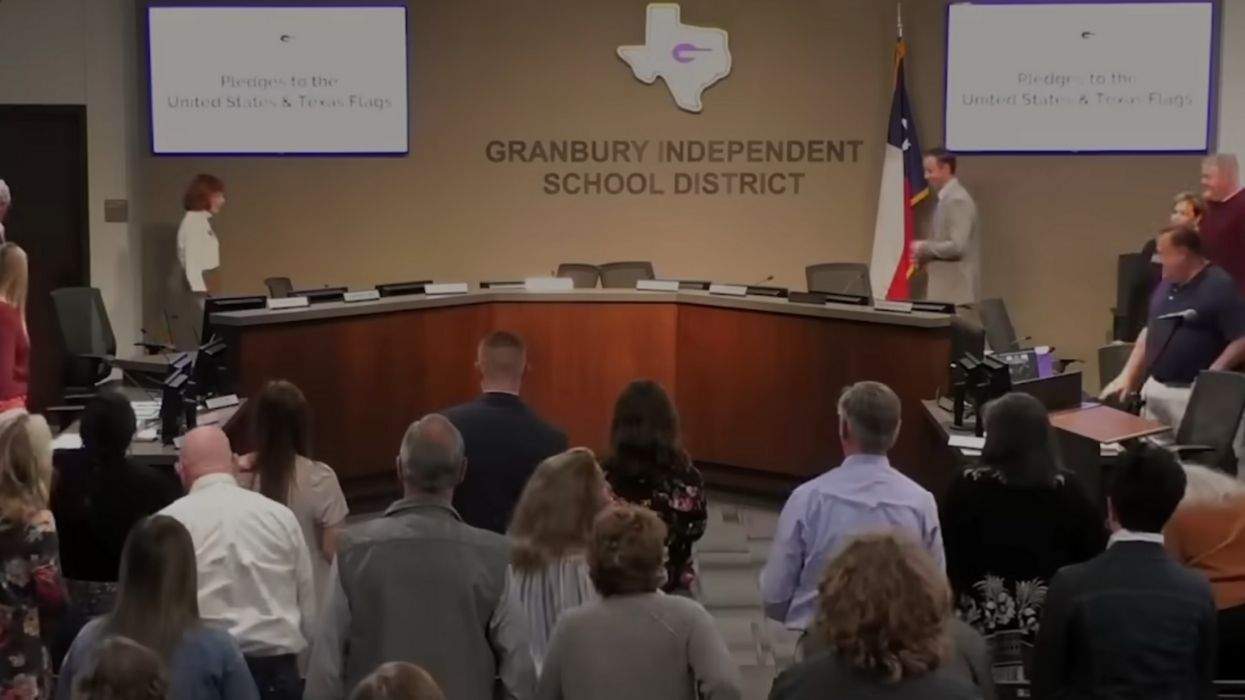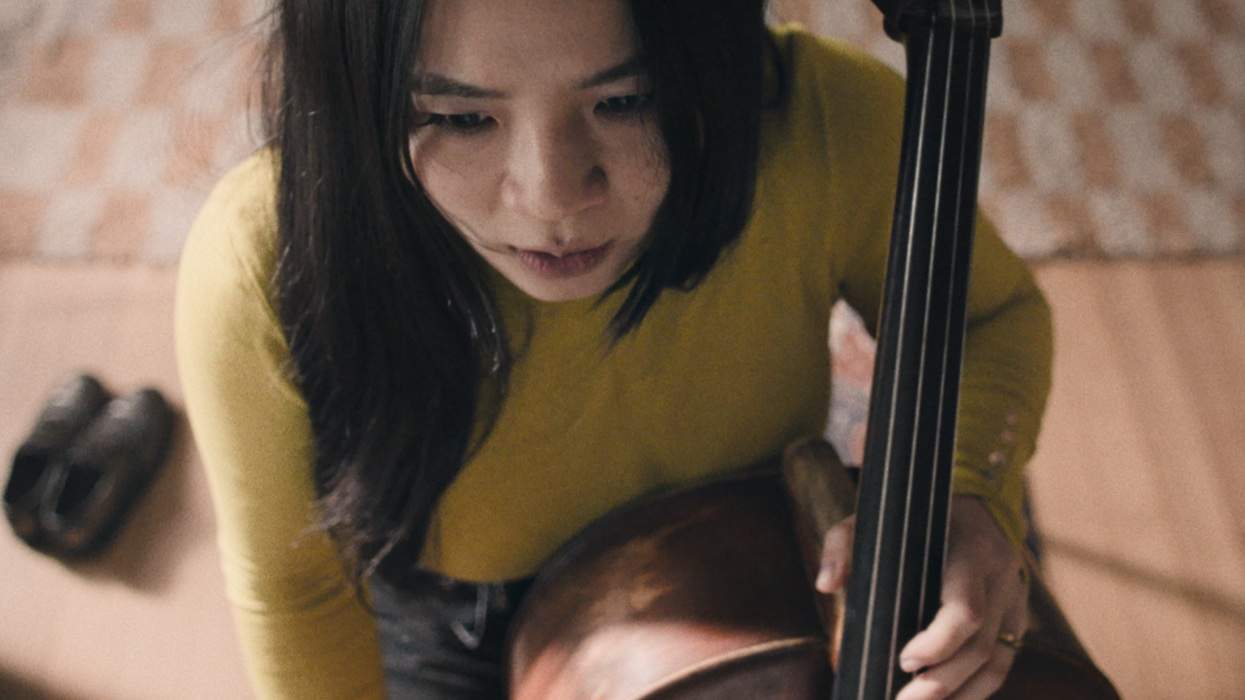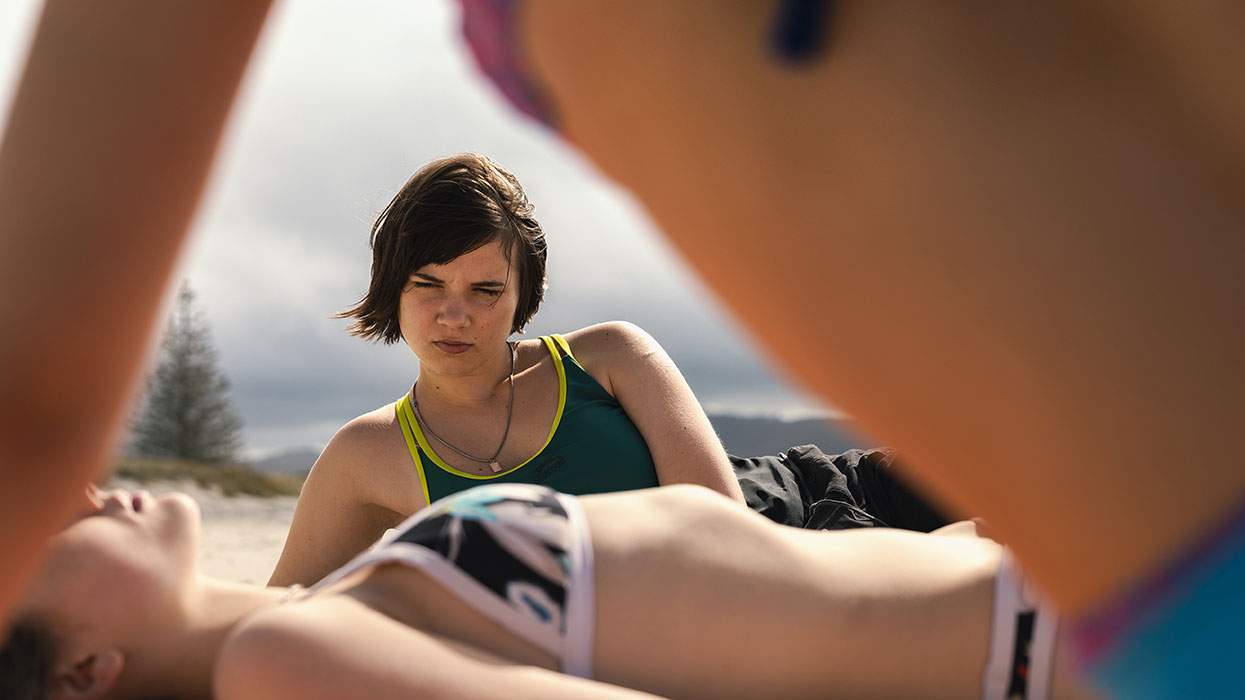It's no secret that director Kimberly Peirce became an overnight sensation when her debut film, Boys Don't Cry, about a murdered transgender man in Nebraska, became the most acclaimed film of 1999. In it she teased out an absolutely transformative performance from actress Hilary Swank, who had to channel a young closeted man on the cusp of becoming himself and then suffering the great horror of violence that ended his life.
Peirce, who is drawn not just to the authentic portrayal of violence but also the humanity behind that violence, managed to offer up a film in which everyone was complex and fleshy and shaped by their backgrounds and histories. Now she's doing it again with an adaptation of Stephen King's seminal horror novel Carrie. Her background, she says, has helped prepare her for the cruelty and brutality that lay ahead.
"I don't think personal experience is the be-all, end-all of our interests," Peirce says. "We were all raised straight, and look how queer we are. But I certainly think things do influence you, and I come from a very interesting background."
When Peirce was born, her parents were 15 and 16, a lower-middle-class but beautiful couple from Harrisburg, Pa. "My dad was a builder and was taught to fight, to fuck, and to drink by his stepfather, and that has created a whole mythic life for him. But I think that violence is generational, sadly. So the psychological and physical violence that was inflicted upon him, he inflicted upon me."
The auteur says she was "very lucky because I was an artist and because I had education. Rather, I sought out education. I learned to turn my violence, the violence that was inflicted upon me, into stories. But then I also have empathy. I've known a lot of women who have been raped. I've known a lot of people who have been on the other side of physical violence, and not only was there my own, but there was a great interest in humanity and who experienced that stuff, and of course that led to Boys, Stop-Loss... Same thing with Carrie. Maybe I haven't lived Carrie's exact experience, but you draw from the things that are similar in your own life that you are working out."
 Moretz as Carrie in the film's climactic scene.
Moretz as Carrie in the film's climactic scene.
The pressure is on with Carrie, though. Stephen King's original manuscript for Carrie was rejected 30 times before he gave up and canned it. His wife, Tabitha, saw such potential in the story of a bullied and sheltered teen with telekinetic powers that she fished it out of the trash, and eventually, in 1974, it became King's first published book.
Many agreed that the novel clearly reflected the struggle between feminists and antifeminists in the 1970s as well as the male concern with women's rising power at the time.
"[King] has all kinds of understanding about women," says Peirce, who discounts early feminist criticism that men couldn't write real women's stories. "When I read King again it was like, wow, it was the '70s. Women were just getting power. Women have always been sexual, but their sexuality was more accepted by the culture -- and isn't this a story on some level about men's fear of women?"
She says, sure, a man can be sensitive to women's issues, but he's still a man, which means "culturally he lives in a world where women's power can be threatening. I thought that was really interesting lens to look at it and then to say, 'OK, what does this story mean now, 40 years later?' Because it's not the same. Women have had, certainly not enough, but women have had more power. Women's lib happened. Women's sexuality is out there. Some people might say it's a stretch to say it's a feminist text. But in a lot of ways it is. The central character is a woman, the central relationships are between women -- between a mother and a daughter and between a girl and all these other girls."
It's the girls that root Carrie, which comes out today. Consummate actress Julianne Moore plays Carrie's Christian fundamentalist mother, Margaret, and Chloe Grace Moretz is the title character. The latter casting was occasionally criticized (the argument was that Moretz was too beautiful to play Carrie, unlike Sissy Spacek, who played Carrie in Brian De Palma's 1976 version), but Peirce says she cast Moretz for realness. "I really have a teenager playing a teenage role. Sissy is a goddess, she did it great, she played it perfect. But let's just say there's room for something else."
That something else means Peirce isn't remaking De Palma's film, she's gone back to the book for her inspiration. So, without De Palma's male gaze, can we expect fewer bouncy locker room scenes in slo-mo?
 Julianne Moore in Carrie.
Julianne Moore in Carrie.
"Knowing me, you might not be able to," Peirce says, chuckling. "I certainly like my share of bouncy locker room scenes, as a woman who appreciates women. But it's a great question. [The studio] came to me to say they were interested in me doing Carrie and I was like, Why? That was my initial reaction. Why are you remaking it and why are you interested in me? They said it was because of Boys Don't Cry, and I was even more confused because I thought, Boys Don't Cry is so different from Carrie. But then when I read the book I was like, Oh, my God, Boys Don't Cry is Carrie."
Like Boys' Brandon Teena, Carrie is a "misfit, the person who wants to be accepted and be normal" in a world that won't allow that. De Palma is a friend of Peirce's, and she says his Carrie is "brilliant and operatic" but different from hers. "I suddenly saw these two movies coexisting in a world and I called him," Peirce says. "I love him. You know what he said to me? After Boys Don't Cry, we'd go out to dinner and he's like, 'You got it all too quick.' And I said, 'What do you mean?' He said, 'You got everything. The rest of us had to fight years to get what you got, the success. You need to have a bomb.'"
But De Palma loved the idea of Peirce making her own Carrie and encouraged her to do it. So she read the book three times back to back on a flight to Turkey and fell in love with Carrie, the person. "She's this misfit girl who's awkward, who's unattractive, who has this really intense relationship with her mother. It's very much like a love story with a mother -- she beats her, she uses corporal punishment, and she controls her, all in an effort to protect her out of this severe love."
The film is "really the story of Carrie coming into her own. It's really the story of her coming into her power. I make it a superhero origin story. She's going into the school and dealing with these kids where it's just this systematic abuse -- that's the life she's been living. And on this particular day things get even worse. She gets bullied out of the P.E. class, then she has her period, and she gets bullied more."
 Chloe Sevigny and Hilary Swank in Boys Don't Cry.
Chloe Sevigny and Hilary Swank in Boys Don't Cry.
That day led to one of filmdom's greatest scenes, the scene that actually makes the most masculine of men feel squeamish. Because the blood in the scene "in the beginning is menstruation. How many movies dare to put a period on-screen? Why is bleeding so shameful? Why is the period something to be hidden? Well, it's really wonderful that King had the audacity to put it out there and we had the audacity to visit it."
After working so closely with young actors like Hilary Swank, Peter Sarsgaard, and Channing Tatum -- actors who she helmed at a very early stage in their careers -- she says it was a surprise to discover Julianne Moore's experience. "It's kind of shocking when you go up to Julianne Moore, and I have it all figured out and she's like, 'That's OK, I figured it out.' Not only is there a great innate talent, but she's been around the block. And the reason I say that is as a director, there's something so wonderful about somebody who knows their craft. And she knows it inside and out."
Moore and Peirce both took Moretz under their wing and watched the precocious child actor transform on-screen. Will it be the kind of transformation Swank pulled off in Boys?
"I certainly can say it's completely in the same DNA," Peirce admits. After Moretz told Peirce she'd go to great lengths to get the role right, the filmmaker told her she needed a little teenage rebellion.
"I was like, 'You know what this story is about? A girl who goes out and rebels. So you've got to move out of your house. You've got to start talking back to your mom.' And she got very excited, but we couldn't go that far."
The young star had to "find her adult voice" and identify with Carrie. "I actually took her to women's shelters" to meet and empathize with young women who have dealt with economic hardship, Peirce says. "This is a girl who doesn't have money. You're rich. And I was like, 'We have to somehow get you in touch with the reality of this girl.' So it was almost like teaching her what a Julianne Moore already knows how to do."
 Pierce with some of her Stop-Loss actors, Ryan Phillippe and Abbie Cornish.
Pierce with some of her Stop-Loss actors, Ryan Phillippe and Abbie Cornish.
At the heart of the film, for Peirce, is the "beat-by-beat escalation" of the bullying Carrie is subjected to and the difference between how girls bully and how boys bully. "Boy bullying is physical," Peirce says. "I hate to centralize gender, because that's the last thing, as queer people, we want to do, but let's just say on some level, there is some truth to this. That with girls it's less physical, but it's relentless, it's verbal. That's how girls attack one another."
"With bullying now, it never goes away," she adds. "Once you put it on a tape, once you put it on the Internet, if you're the kid who's bullied -- it used to be you could go home, shut the door, and the bullying went away. It's like a glass house; you can never get away from it now."
Many young LGBT viewers will likely see themselves as walking in Carrie's shoes. "This is the story of the rise of the underdog," Peirce says. "The person who gets pushed around ends up getting empowered. Well, what happens when they have that power?"
But for a filmmaker who loves to explore the darkness and violence, will we ever see a comedy?
"Oh, God, yes," she says through a chortle. "There is humor in this movie, it's very dark. I scream with laughter whenever [Julianne Moore] is on-screen because I just think she's hilarious. There is a lot of dark humor in this. But I have a really great butch-femme romantic sex comedy that I've been writing. It's just a question of timing -- is the world ready for it? It's kind of in the Woody Allen, Judd Apatow mode. Because, you know, butches, right? Butches face a lot of the same challenges that Jewish guys face."
Also in the works now is a story about her father, involving a girl like herself who leaves Miami only to come back and help her father at the end of his life. "[My father] got very rich and had a lot of power and really destroyed himself. And at the very end of his life, I came back and helped him die. It may sound depressing, but it's actually very funny because all the women that he ever loved -- and he was very charismatic -- they all came back too. And so it was me kind of navigating through this."
Just getting a film made is an accomplishment for a woman these days, she says.
"We need more women directing. It's heartbreaking. And you look at the television statistics [of female directors], and it's heartbreaking. I mean, they say it's 6%, I think it's 2%. It should be 50-50, right?"
















